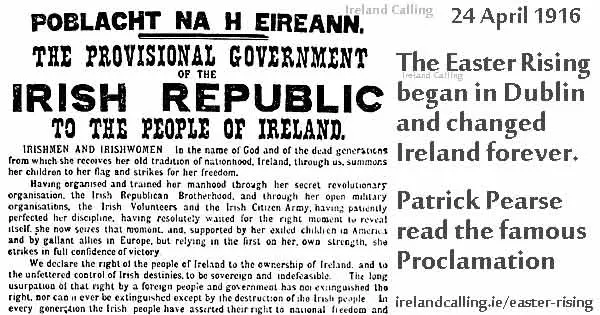The Proclamation of the Irish Republic is one of the most important documents in Irish history. It was a declaration of independence by the leaders of the 1916 Easter Rising, who also announced themselves as the Provisional Government of the Irish Republic.

It was read by Patrick Pearse outside the General Post Office (GPO) on Sackville Street (now O’Connell Street) to passers-by at the outset of the Rising on Easter Monday, 24 April 1916. Pearse is widely regarded as the first person to read it in public, but in fact, the Countess Markievicz had read it an hour earlier to members of the Irish Citizen Army as they gathered outside Liberty Hall before setting off for their stations across Dublin.
The Proclamation bore the names of the seven leaders of the Rising: Tom Clarke, Seán MacDiarmada (MacDermott), Thomas MacDonagh, Patrick Pearse (who used his initials P.H Pearse), Éamonn Ceannt, James Connolly and Joseph Plunkett.
For all of their outward show of confidence, none of them expected to succeed and fully expected to be executed if they failed. It meant that in signing the Proclamation, they knew they were effectively signing their own death warrants.
The Proclamation was surprisingly modern in its outlook, taking care to mention Irishmen and Irishwomen equally, stressing the importance civil liberties, equal rights and equal opportunities, and wishing to forget the differences of the past between the Catholic majority and Protestant minority.
The reference to men and women voting in a new government was also ahead of its time as women were not allowed to vote in Britain, nor most other countries, at that time. This is the text of the Proclamation as originally written.
POBLACHT NA H EIREANN
THE PROVISIONAL GOVERNMENT
OF THE
IRISH REPUBLIC
TO THE PEOPLE OF IRELAND
IRISHMEN AND IRISHWOMEN In the name of God and of the dead generations from which she receives her old tradition of nationhood, Ireland, through us, summons her children to her flag and strikes for her freedom.
Having organised and trained her manhood through her secret revolutionary organization, the Irish Republican Brotherhood, and through her open military organisations, the Irish Volunteers and the Irish Citizen Army, having patiently perfected her discipline, having resolutely waited for the right moment to reveal itself, she now seizes that moment, and, supported by her exiled children in America and by gallant allies in Europe, but relying in the first on her own strength, she strikes in full confidence of victory.
We declare the right of the people of Ireland to the ownership of Ireland, and to the unfettered control of Irish destinies, to be sovereign and indefeasible. The long usurpation of that right by a foreign people and government has not extinguished the right, nor can it ever be extinguished except by the destruction of the Irish people. In every generation the Irish people have asserted their right to national freedom and sovereignty; six times during the past three hundred years they have asserted it in arms. Standing on that fundamental right and again asserting it in arms in the face of the world, we hereby proclaim the Irish Republic as a Sovereign Independent State, and we pledge our lives and the lives of our comrades-in-arms to the cause of its freedom, of its welfare, and of its exaltation among the nations.
The Irish Republic is entitled to, and hereby claims, the allegiance of every Irishman and Irish woman. The Republic guarantees religious and civil liberty, equal rights and equal opportunities of all its citizens, and declares its resolve to pursue the happiness and prosperity of the whole nation and of all its parts, cherishing all the children of the nation equally, and oblivious of the differences carefully fostered by an alien government, which have divided a minority from the majority in the past.
Until our arms have brought the opportune moment for the establishment of a permanent National Government, representative of the whole people of Ireland and elected by the suffrages of all her men and women, the Provisional Government, hereby constituted, will administer the civil and military affairs of the Republic in trust for the people.
We place the cause of the Irish Republic under the protection of the Most High God, Whose blessing we invoke upon our arms, and we pray that no one who serves that cause will dishonour it by cowardice, inhumanity, or rapine. In this supreme hour the Irish nation must, by its valour and discipline and by the readiness of its children to sacrifice themselves for the common good, prove itself worthy of the august destiny to which it is called.
Signed on behalf of the Provisional Government,
THOMAS J. CLARKE
SEAN MAC DIERMADA, THOMAS MACDONAGH
P. H. PEARSE EAMONN CEANNT
JAMES CONNOLLY JOSEPH PLUNKETT
There are approximately 30 original copies of the Proclamation still in existence. They’re kept in the National Print Museum where they are available for the public to view.
easter-rising.html